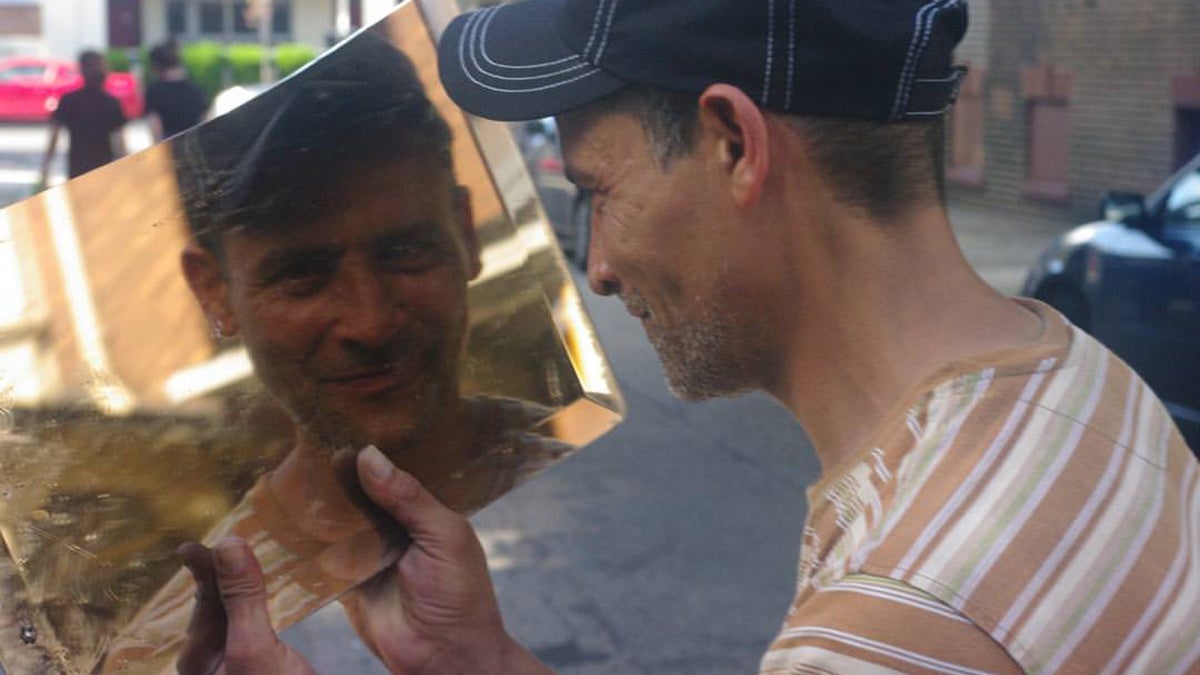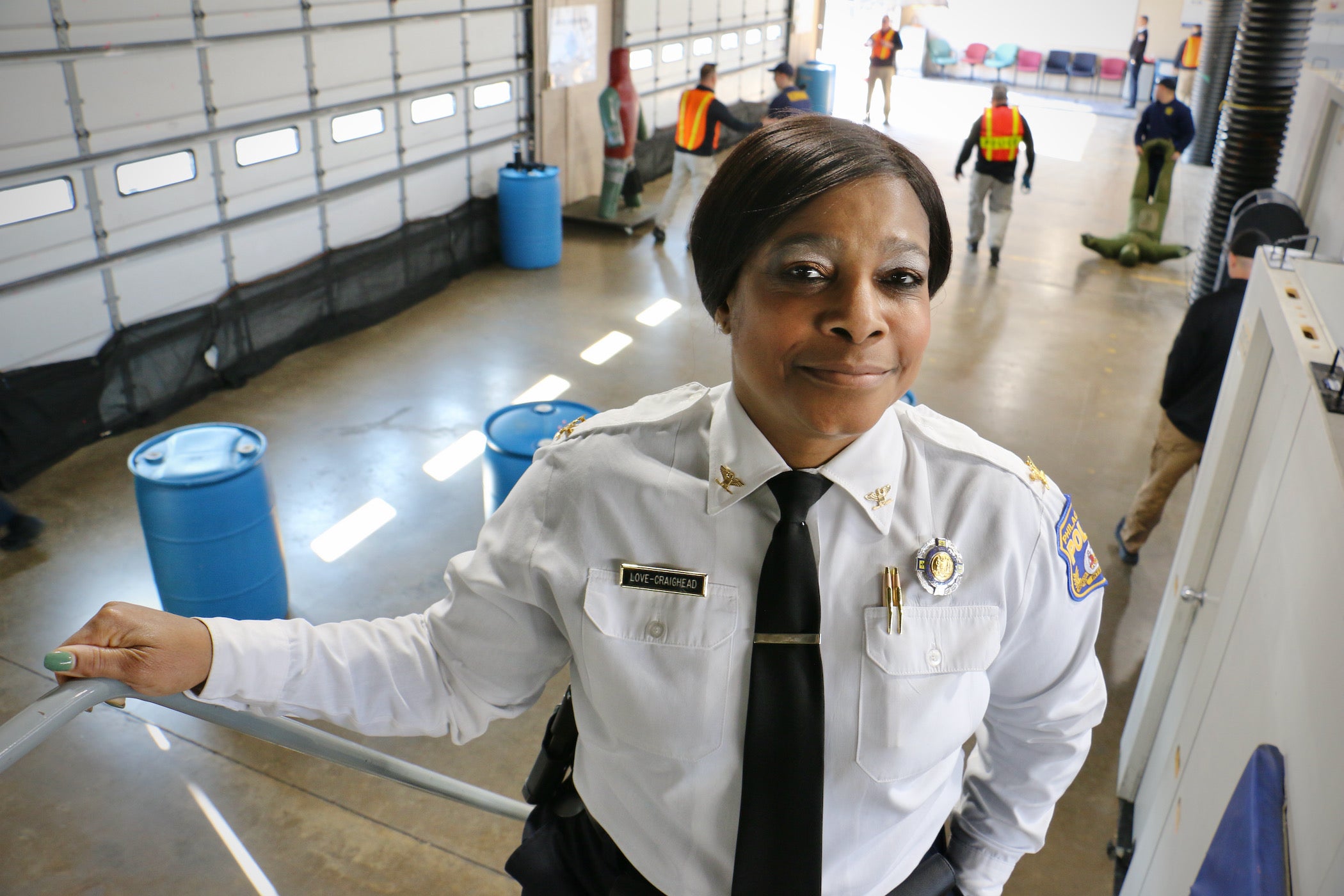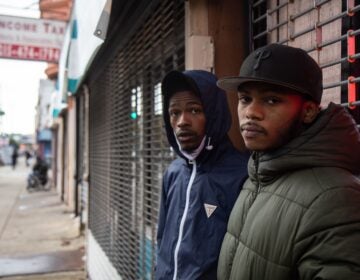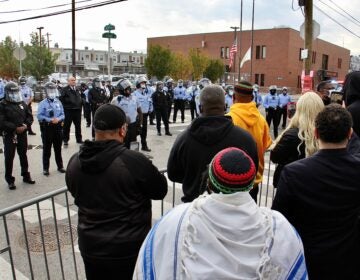West Philly’s ‘Crazy drunk Omar’ troubled and troubling in death as in life

Omar was a familiar face in West Philadelphia. (Yoni Kroll)
Something about crazy drunk Omar being dead. On a friend’s facebook page. That’s how I got the news last week. That’s one of the ugly warts of the social media information tunnel. You get your news fast, but it isn’t always delivered with grace.
“Crazy drunk Omar” just happened to be one of my more treasured acquaintances from my years in West Philly. He had the biggest reputation in the neighborhood, perhaps in the city. His background was as colorful and mismatched as his outfits. Some days he’d casually wander into Green Line Cafe wearing a joker hat with a track jacket and corduroys tucked into his knee-high wool socks.
Everyone in the neighborhood was accustomed to him staggering around the intersection of 45th and Locust, until late in the evening. If there was ever one man who managed to drive down property values all on his own, it was Omar.
My friends and I all knew he was from Morocco. And we heard that he had spent a lot of time in France. Other than that, his history was a potluck of speculation. While no one was sure of the man’s background, everyone had an opinion. “Divisive” is the word that comes to mind, but that seems to come up short.
Property owners (especially those within a three-block radius of 45th and Locust) often led the crusade against him — understandably: His drunken rantings and ravings often terrified the less eccentric personalities of the already eccentric neighborhood. Some women have shared stories of Omar abusing and assaulting them; others have stories of the man escorting them home in the wee hours. He would stand in the middle of the street and aim imaginary rifles at passing cars. Perched on a stoop, he’d toss barbs at passing University of Pennsylvania students, calling out their (perceived) vanity and egoism with as much ruthlessness as eloquence.
Few had any straight answers about his housing situation. Local punks and other benevolent wingnuts would offer up couches on porches. A woman from the suburbs would occasionally gather him up off the sidewalk and cart him off to the land of white picket fences, only to deposit him back in my neighborhood hours or days later. His return was signaled by his trademark lexicon of molotovs: “Puppet!” (by which he meant about 85 percent of the populace) or the enigmatic “Regroup!”
This all may lead you, reader, to believe this man was a sociopath, or at least categorically insane. However, ignoring his startling acts of kindness would be unjust. I recall him chasing down a man who had knocked a woman against the side of a car, and holding him up until police arrived. Omar would drop off clothes and furniture at the houses of his friends in the neighborhood. Before I embarked on a long bicycle trip, he presented to me a small, collapsible telescope. No one knew how he acquired the means to purchase these things. Perhaps he was just passing along a little good will.
Omar and I were very friendly, and when he was sober, we had lively and often profound conversations. Sitting on my porch on 45th Street, I’d glance over my guitar, and there he’d be — invisible assault rifle cocked and loaded, hollering himself hoarse into the black night about gamma ray bursts and emotional wastelands and spectres of the night. As any neighbor around those environs could relate, I just didn’t feel like dealing with him.
I recall one evening, about four years ago, sitting on my porch, playing a heartfelt song about love lost that I had recently penned. Omar marched up to the porch. He was farther from sober than I now am from that house. (I’m writing from Guatemala.) I braced myself but played on.
He sat down on a trunk opposite me. He immediately shut up and dropped his head between his knees, slowly rocking to the music. A cigarette smoldered through its short life between his fingers. I could smell the whisky from across the porch. After I finished the song, he looked up at me. The gentleness had returned to his eyes, and my memory suggests they had misted over. He put his index finger to his lips. He slowly stood up, and cradled my head in his hands, softly by the temples. For a solid 10 seconds, he pressed his forehead against mine, without removing his hands.
Then he offered up one of his crooked smiles, baring his inconsistent teeth, and peeled out into the night to resume his imaginary rifle-pointing at passing cars.
To call Omar mentally ill is to call the static, disaffected temperament of the masses sane. Omar detested the use of smart phones. He immediately recognized their narcotic-like addiction potential, and saw what zombies they made of their users. He could detect unchecked vanity simply in the walk and the dress of a passerby. He lacked the inhibition to keep these comments to himself. Justifiably, this made many people angry at him — often to the point of calling the police or simply knocking him out themselves.
There’s no doubt that many of the things that fell out of his drunken mouth were reprehensible. I think now of a young Greek girl, whose parents owned a local pizzeria, who once saw Omar being shooed up the block by some beat cops. I stood by her side that evening. At 12 years old, she had the poise and perspective to holler up at them “He’s a good man when he’s sober!”
I’m not trying to convince anyone that Omar was “normal.” But as I ponder his apparent suicide, I can’t help but think that here we truly had one of God’s own in our midst, for the 50-odd years he roamed the material plane. Perhaps his sensitivities were so keen that he couldn’t bear to contain the joy and sorrow that surrounded him, so he immediately gave back that which he was given.
—
Julian Root, 29, was conceived in West Philly, was born in Abington, and grew up between the lines of city, suburb, and pasture. He spent about 10 years as a bicycle messenger and attended Temple University. He now makes his living playing the banjo in La Antigua, Guatemala. His heroes are Dorothy Parker, Groucho Marx, Laura Jane Grace, and Erik Petersen. It was once suggested that he is a 75-year-old man stuck in a 25-year-old’s body. (Add a few years for inflation.)
WHYY is your source for fact-based, in-depth journalism and information. As a nonprofit organization, we rely on financial support from readers like you. Please give today.




